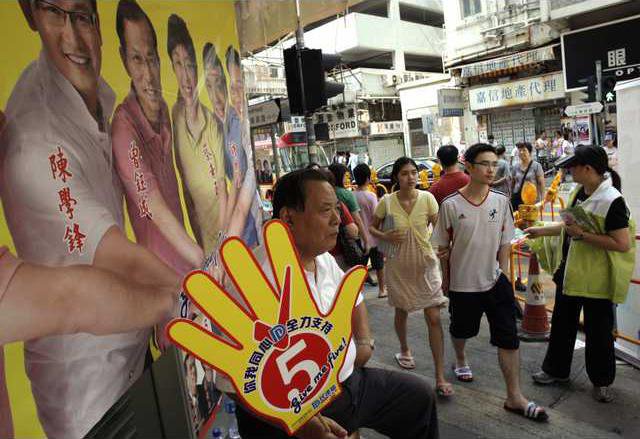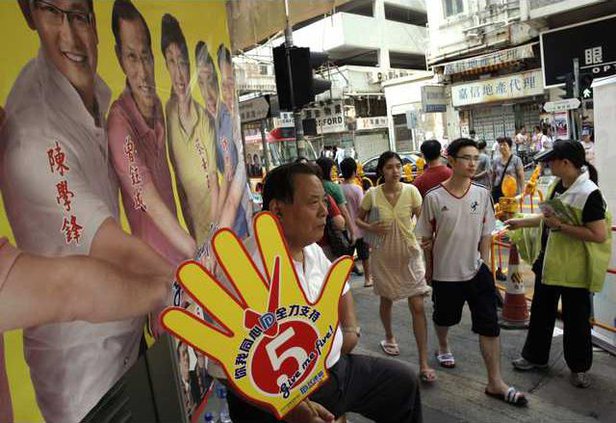HONG KONG — Hong Kong voters turned out in thinner numbers Sunday for legislative elections that threatened to set back the pro-democracy opposition and its push for greater political freedoms in the Chinese-ruled territory.
The opposition camp was expected to win fewer votes than in the 2004 election as concerns about wages, education and inflation overshadowed issues of democratic reform. Four years ago, democratic parties captured new seats amid widespread anger over Beijing-backed officials and policies.
‘‘The democrats face a tough fight,’’ said Ma Ngok, a political analyst at Hong Kong’s Chinese University. ‘‘They could see their presence in the legislature diminished.’’
Results were expected Monday morning. About 40 percent of registered voters had cast ballots about an hour before polls closed, compared to a record final turnout of nearly 56 percent four years ago.
With 46 of 60 legislative seats up for grabs, aspirants fanned out across the territory to rally supporters. They chanted slogans from open-top buses cruising local neighborhoods and visited restaurants armed with bundles of campaign leaflets. Election banners and flags adorned buildings everywhere.
Opinion polls showed that high-profile pro-democracy figures such as Emily Lau, who has been fighting for democracy in the legislature for 17 years, and maverick activist Leung Kwok-hung might lose their seats.
Conservative Regina Ip, a controversial former Hong Kong security chief who caused an uproar in 2003 by promoting an anti-subversion bill, was expected to succeed in her bid.
Voters directly pick 30 of Hong Kong’s lawmakers, but the other 30 are chosen by special-interest groups such as business leaders, doctors and accountants, who are expected to back pro-Beijing candidates.
The former British colony returned to Chinese rule in 1997. China quelled much of the debate over democratic reform last year when it announced the territory could elect its own leader in 2017 and all of its legislators in 2020, at the earliest.
Chief Executive Donald Tsang, a veteran civil servant who has pledged to move democratic reforms forward but often toes Beijing’s line, said Hong Kong faces difficult years ahead.
‘‘These will be particularly trying years in the midst of global financial troubles,’’ said Tsang, who began his second term last year after being chosen by an 800-member committee stacked with Beijing loyalists. ‘‘We need good legislative councilors.’’
Despite the waning popularity of Tsang and his government, democratic lawmakers have been hard-pressed to convert broader discontent into support.
The opposition could lose as many as five of their 26 seats, Ma and other analysts said. Any more than that would cost them their veto power and greatly expand the ability of conservatives to mold Hong Kong’s election law in China’s favor.
‘‘This is a critical moment for the pro-democracy camp,’’ Audrey Eu, an opposition candidate who leads the Civic Party, said as she rallied supporters in downtown Hong Kong on Sunday morning. ‘‘We need to ... preserve our bargaining power.’’
Lower turnout would likely benefit conservative parties because they have effective turnout operations and rely less on overall numbers, Ma said.
While Hong Kong is now Chinese territory, it is ruled under separate political and economic systems. Hong Kong’s mini-constitution promises eventual democracy and Western-style civil liberties commonly denied in the mainland.
———
Associated Press Writer Jeremiah Marquez contributed to this report.
The opposition camp was expected to win fewer votes than in the 2004 election as concerns about wages, education and inflation overshadowed issues of democratic reform. Four years ago, democratic parties captured new seats amid widespread anger over Beijing-backed officials and policies.
‘‘The democrats face a tough fight,’’ said Ma Ngok, a political analyst at Hong Kong’s Chinese University. ‘‘They could see their presence in the legislature diminished.’’
Results were expected Monday morning. About 40 percent of registered voters had cast ballots about an hour before polls closed, compared to a record final turnout of nearly 56 percent four years ago.
With 46 of 60 legislative seats up for grabs, aspirants fanned out across the territory to rally supporters. They chanted slogans from open-top buses cruising local neighborhoods and visited restaurants armed with bundles of campaign leaflets. Election banners and flags adorned buildings everywhere.
Opinion polls showed that high-profile pro-democracy figures such as Emily Lau, who has been fighting for democracy in the legislature for 17 years, and maverick activist Leung Kwok-hung might lose their seats.
Conservative Regina Ip, a controversial former Hong Kong security chief who caused an uproar in 2003 by promoting an anti-subversion bill, was expected to succeed in her bid.
Voters directly pick 30 of Hong Kong’s lawmakers, but the other 30 are chosen by special-interest groups such as business leaders, doctors and accountants, who are expected to back pro-Beijing candidates.
The former British colony returned to Chinese rule in 1997. China quelled much of the debate over democratic reform last year when it announced the territory could elect its own leader in 2017 and all of its legislators in 2020, at the earliest.
Chief Executive Donald Tsang, a veteran civil servant who has pledged to move democratic reforms forward but often toes Beijing’s line, said Hong Kong faces difficult years ahead.
‘‘These will be particularly trying years in the midst of global financial troubles,’’ said Tsang, who began his second term last year after being chosen by an 800-member committee stacked with Beijing loyalists. ‘‘We need good legislative councilors.’’
Despite the waning popularity of Tsang and his government, democratic lawmakers have been hard-pressed to convert broader discontent into support.
The opposition could lose as many as five of their 26 seats, Ma and other analysts said. Any more than that would cost them their veto power and greatly expand the ability of conservatives to mold Hong Kong’s election law in China’s favor.
‘‘This is a critical moment for the pro-democracy camp,’’ Audrey Eu, an opposition candidate who leads the Civic Party, said as she rallied supporters in downtown Hong Kong on Sunday morning. ‘‘We need to ... preserve our bargaining power.’’
Lower turnout would likely benefit conservative parties because they have effective turnout operations and rely less on overall numbers, Ma said.
While Hong Kong is now Chinese territory, it is ruled under separate political and economic systems. Hong Kong’s mini-constitution promises eventual democracy and Western-style civil liberties commonly denied in the mainland.
———
Associated Press Writer Jeremiah Marquez contributed to this report.

